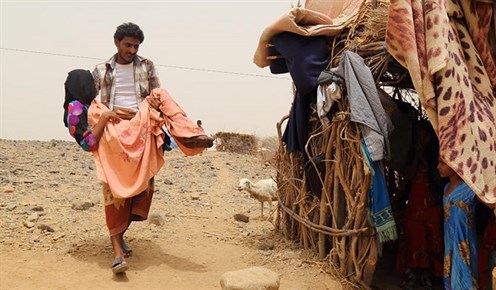01 June 2016
US suspends cluster munitions sales to Saudi Arabia
Civilian harm in Yemen prompts decision

Fatima Ibrahim al-Marzuqi is being carried by her brother because she is not able to walk due to her injuries sustained during a cluster munition attack on Malus village (Yemen).
© 2015 Ole Solvang/Human Rights Watch
The United States is suspending transfers of cluster munitions to Saudi Arabia in the wake of civilian harm caused by the weapon in Yemen.
"We applaud this decision," said Megan Burke, Director of the Cluster Munition Coalition. "The United States is rightfully applying its own national law that forbids transfers of cluster munitions to states that might use them against civilian targets or in civilian areas."
The news was revealed on 27 May 2016 by Foreign Policy magazine, and further confirmed by the White House on 31 May 2016.
The decision follows numerous reports released by CMC members, such as Human Rights Watch and Amnesty International, demonstrating the grave humanitarian impact of these weapons being used by the Saudi-led armed coalition in Yemen. On 6 May 2016, the Cluster Munition Coalition called on the US to investigate the consequences of cluster munition use in Yemen and whether the weapons were used in violation of US law.
The CBU-105 Sensor Fuzed Weapon produced by Textron is the only cluster munition exported from the US in recent years.
"Whenever and wherever they are used, cluster munitions end up causing disproportionate harm to civilians," said Burke. "The only way to prevent such harm is to renounce cluster munition production, transfers and use altogether, once and for all."
According to Cluster Munition Monitor, 92% of cluster munition casualties recorded worldwide in 2010-2014 were civilians.
The Cluster Munition Coalition urges the United States to make the ban on transfers permanent, to forbid any future production of cluster munitions, and to join the Convention on Cluster Munitions. The Cluster Munition Coalition has called on the Saudi-led armed coalition numerous times to stop using cluster munitions and to join the Convention.
Sample media coverage
Exclusive: White House Blocks Transfers of Cluster Bombs to Saudi Arabia, Foreign Policy, 27 May 2016. "Riyadh's air war in Yemen has killed and injured hundreds of civilians. Washington is finally trying to stem the carnage."
The Obama Administration Is Stopping Cluster Bomb Sales to Saudi Arabia, Mother Jones, 31 May 2016. "The controversial weapon is known for indiscriminately killing civilians."
Report says US to stop selling cluster bombs to Saudi Arabia, RI Future, 28 May 2016. "In Rhode Island, where Textron is headquartered, peace activists led by the FANG Collective and the American Friends Service Committee, a Quaker group, have targeted Textron with weekly actions."


